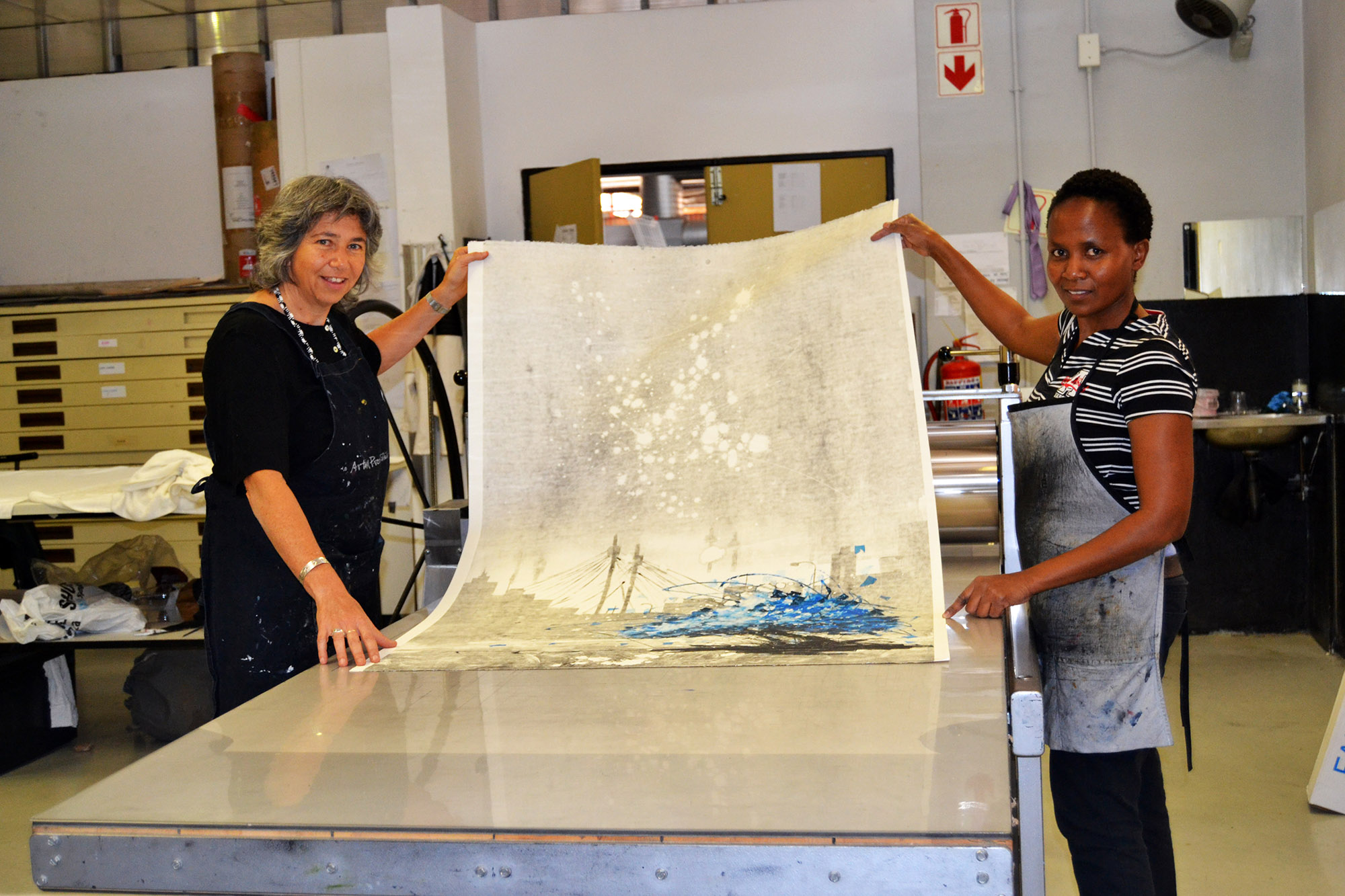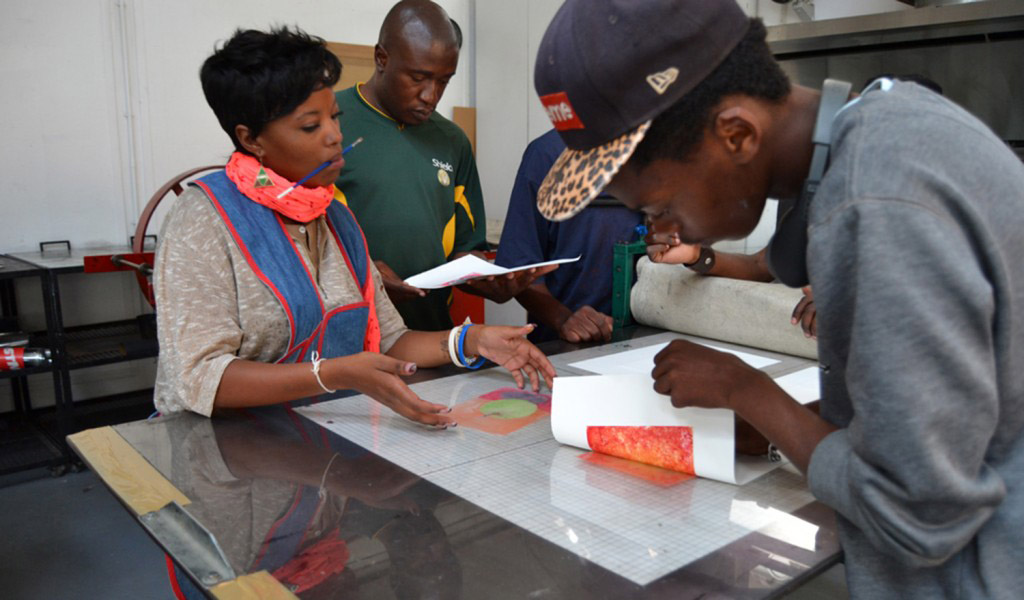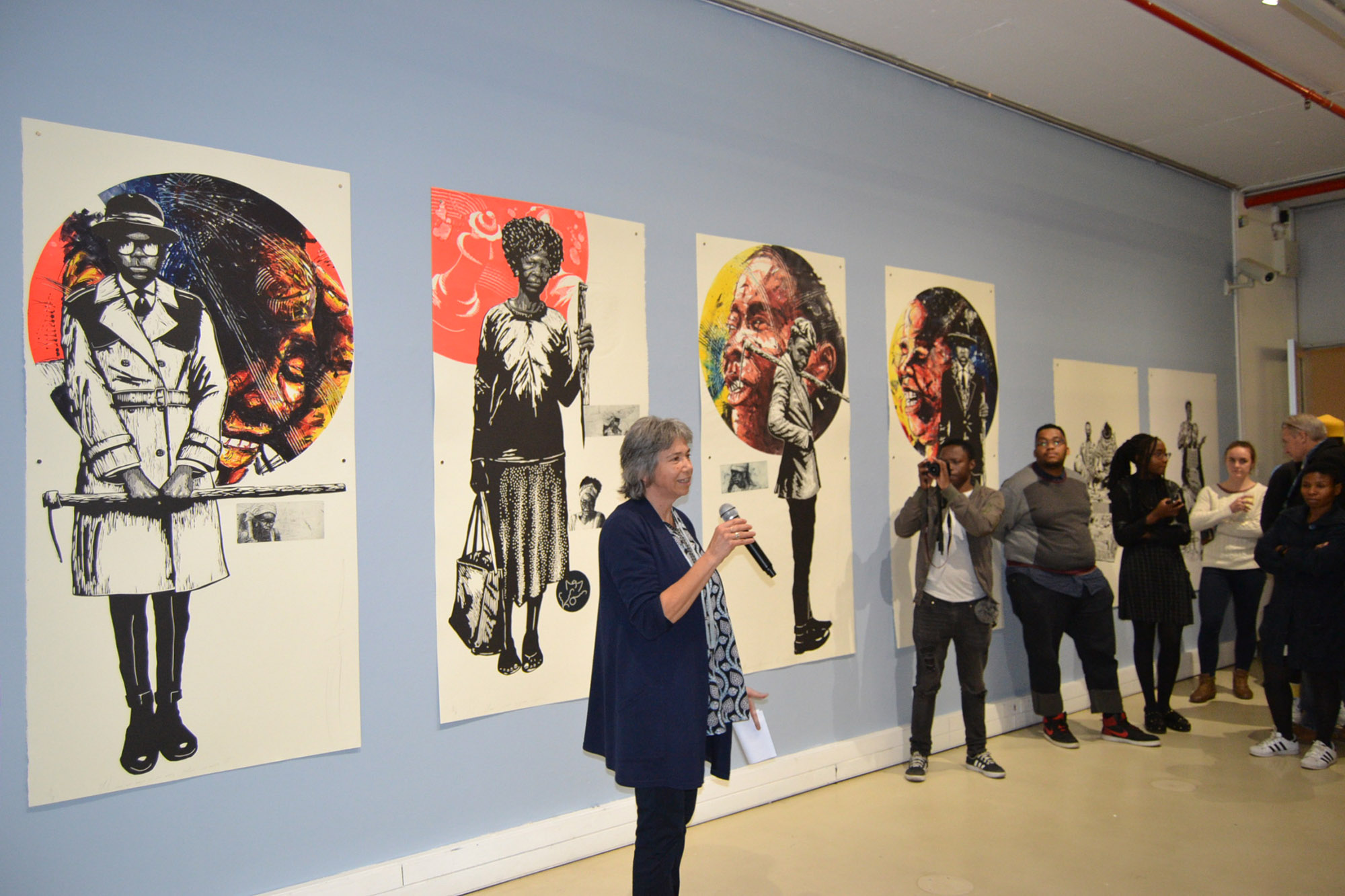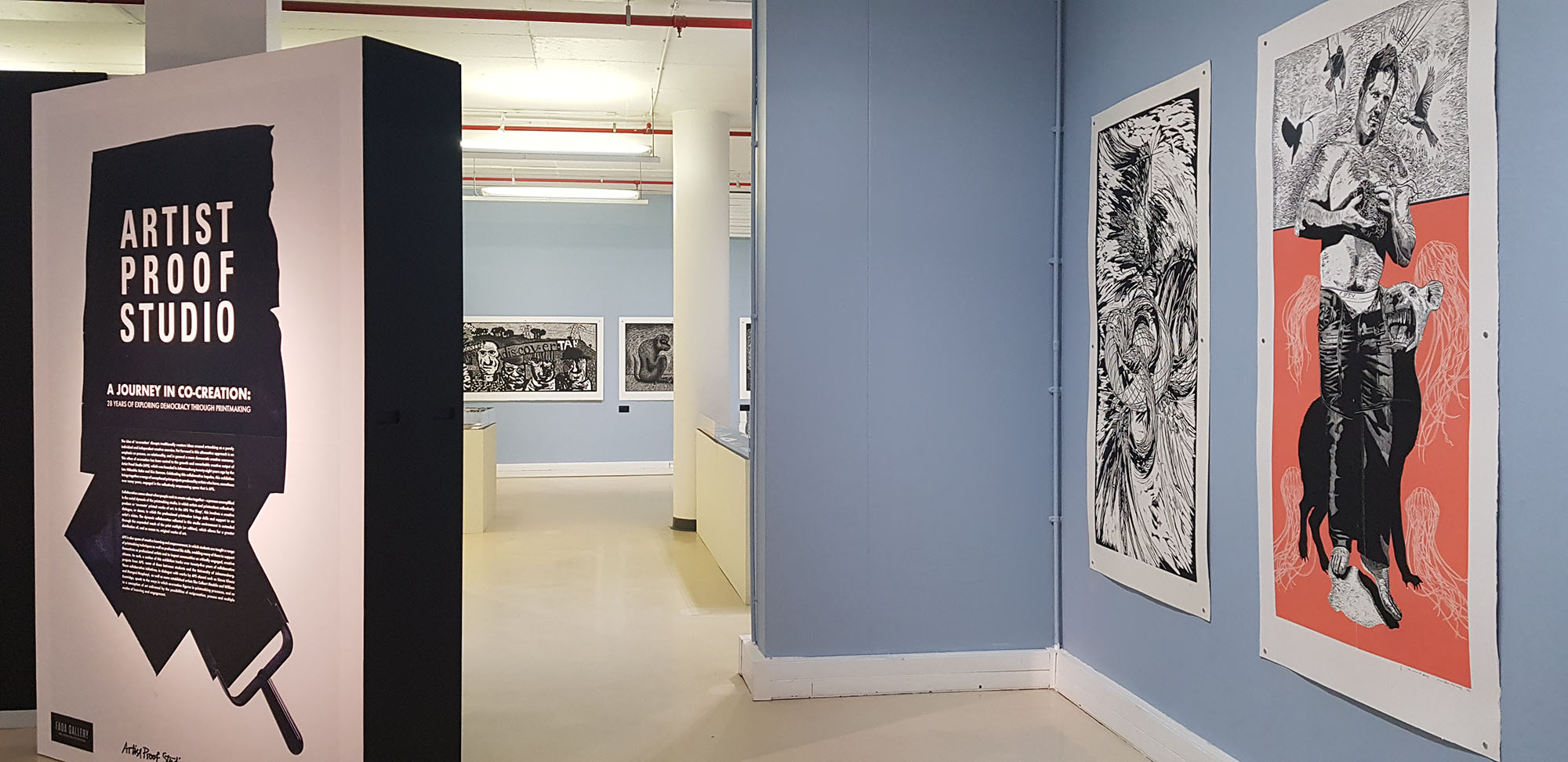ART
Alchemy of printmaking leaves an indelible mark on art world

A Joburg printmaking studio rooted in community, co-creation and an ethos of paying it forward has shown after 28 years that art can be about change and sustainable impact.
Paper sucks up ink under a printmaker’s press, as if it thirsts to take it all in so it can emerge from that exquisite pressure transformed as art, also as possibility.
The enigmatic alchemy of printmaking combined with an intention to make art about community and connecting, has made Joburg’s Artist Proof Studio (APS) an initiative that’s ticked the right boxes for meaningful impact for nearly 30 years.
APS marks its 28th anniversary this month with an exhibition at the University Of Johannesburg (UJ) called “A Journey in Co-creation”. It’s the story of democracy through printmaking says artist and UJ lecturer Professor Kim Berman, who co-founded APS in 1991.

Professor Kim Berman and Pontsho Sikhosansa work on a Ramarutha Makoba print in the Newtown studios. (Photo supplied)
“For me, APS’s story has always run parallel to the story of South Africa’s democracy.”
She sees printmaking as a metaphor for democracy – it’s about affordable mediums, about producing multiples and the essential understanding between printmaker and artist. Building the studio as a place of learning, sharing and community has also defined the heart and vision of APS.
The studio got its start when Berman and fellow artist Nhlanhla Xaba met and set up in an abandoned warehouse in downtown Joburg. It was 1991 and collaborating across the racial divide was a thorny issue. The socio-political climate was also volatile and tense.

More than 500 students have received free training through the Artist Proof Studio over the last 28 years. (Photo supplied)
Yet the pair saw printmaking’s potential to give people who had artistic talent – but not necessarily formal education or money for training – access to art education, personal development and channels through which to sell their work. It was about art as self-actualisation and self-sustainability.
APS’ core has always been about training and art outreach and Berman says: “To date, we’ve had about 500 students come through our three-year training programme. Training has always been free and we accept students based on their portfolios, their values and their commitment and passion to succeed as artists.”

Professor Kim Berman at the opening on the Journey in Co-Creation exhibition that’s on at UJ till 19 July. (Photo supplied)
Today the APS alumni are art world notables, the likes of Philemon Hlungwane, Nelson Makamo and Nicholas Hlobo. The studio has also maintained long-standing collaborations with other art big-hitters like William Kentridge, Norman Catherine, Diane Victor, Colbert Mashile, David Koloane, Mmakgabo Helen Sebidi, Gerhard Marx, Walter Oltmann and Willem Boshoff.
“We have been able to work with some of the most prominent artists because we are about creating excellence, continually raising our game and developing our technical skills training. The artists who collaborate with us demand these standards and they also enjoy the ethos of APS. They want to be part of building up the next generation of artists,” says Berman.

Printmaking makes art more accessible, affordable and celebrates co-creation. (Photo supplied)
It’s reflected in the UJ exhibition with works on display that shows the best of the artists linked to the studio over the last 28 years. Berman beams when she talks about APS alumni, many of whom have successfully used the studio as career springboards. She says Xaba, her co-founder, would have been proud too. Xaba died tragically in 2003 when APS’s original studio went up in flames. Xaba was asleep on a couch in the studio that night and died in the fire.
APS rose from the ashes of loss and heartache and took up its current home in the Bus Factory on Helen Joseph Street, Newtown. Berman says: “The wonderful thing about APS is that it’s gone on to be all these other things with all these other people who’ve made APS the web of co-creation it is today.
“It’s also stronger for never shying away from using art to tackle topics that may be difficult but necessary to confront – from gender inequality to racism, class divides and xenophobia,” Berman says.
APS has over the years established three additional units. These are focused on entrepreneurial innovation and outreach; representing artists to the art market, and producing prints and special projects for artists and clients. APS board member, patron and mentor Lauren Woolf, says marrying these elements to training and education has bolstered the studio’s sustainability and ability to adapt to present-day challenges.
“We’ve been able to create a R3.2-million education endowment because we believe that developing and supporting artists through education is a way to fuel the art economy of the country,” says Woolf.
Support means not just covering tuition and materials but understanding that students’ needs often extend to money for a meal or taxi fares to and from classes. It is also about incorporating principles of developing emotional intelligence, building long-term partnerships, reciprocity, mentoring and paying it forward, says Woolf.
Woolf, as a patron, sponsors the fees of several students and in return receives three artworks a year from the students. Students are also required to do community service. She says these are exchanges of mutual benefit and help to bridge divides between people.
Ben Ngobeni, an APS graduate from the Class of 2016, says before APS, he didn’t think art was a career option. Ngobeni was working as a miner on the West Rand before he became a full-time student in 2014.
“I was drawing in our break times with my mine lamp then one day one of the mine supervisors got hold of a drawing I did. When he said he was going to help me, I thought it was to get a full-time job as a miner because I was a contract worker – I never thought I could have a career in art,” he says.
Ngobeni was put in contact with APS, went through the three-year programme that includes printmaking, drawing, business skills development and visual literacy. Today he’s employed at APS as their outreach coordinator. It’s his passion to take art back to communities like the village he grew up in, in the Nkomazi districts of Mpumalanga.
“The thing about APS is that you come here, as poor as you are, struggling in the townships and it doesn’t matter, it is about using your art to tell your story,” he says.
Thandi Kumalo, who was the recipient of an art residency in Florence through APS, says the opportunity to work and learn abroad took her “art to another level”. She has chosen printmaking as her career path and is now an apprentice printmaker at APS, working under the studio’s master printmakers.
“The community spirit at the studio is what I enjoy most,” she says, pointing out the striking Sizwe Khoza works in the exhibition that she got to work on. Khoza is also an APS alumnus and is making waves in the art world, but he returns to the Newtown studio regularly as a client, and also as a mentor and collaborator. It’s the spirit of art as a democratic process – where the end results benefit most when a few more people pitch in. DM
* A Journey in Co-creation is on at UJ’s FADA gallery till July 19. Kim Berman will be in conversation with William Kentridge discussing co-creation on the evening of July 16 and several walkabouts have been scheduled. For details contact APS on (011) 492 1278.


















